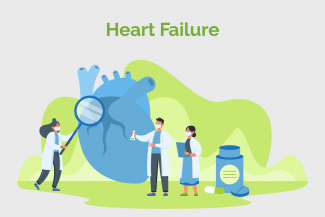
What is ejection fraction (EF)? Why is it important to know your EF number and what it means?
Ejection fraction refers to the Pumping Power of your heart. It is normally 55-60%. It is important to know what is the pumping power of your heart since reduced pumping power or ejection fraction implies that your heart is diseased and increases the risk for congestive heart failure.
Are there different types of heart failure?
Heart failure most often occurs due to reduced ejection fraction – called HFrEF (heart failure with a reduced ejection fraction) or Systolic heart failure where the pumping power of the heart is weak and the heart fails to contract well enough to pump blood to all the organs. This type accounts for 75-80% of patients with heart failure. The common causes for this type of heart failure are Heart attacks or blockages in the heart (coronary) arteries or cardiomyopathy (weakness of the heart muscle).
The less common type of heart failure is called Heart Failure with a preserved Ejection Fraction (HFpEF) or Diastolic heart failure where the heart’s pumping power is preserved but the heart fails to relax adequately. Adequate blood does not enter the left side of the heart leading to build up of pressure and congestion in the lung. This is also called Diastolic heart failure. It can be seen in patients with heart valve diseases, heart beat abnormalities (arrhythmias), high blood pressure, diabetes mellitus, renal failure, thyroid disease, anemia amongst several other causes.















